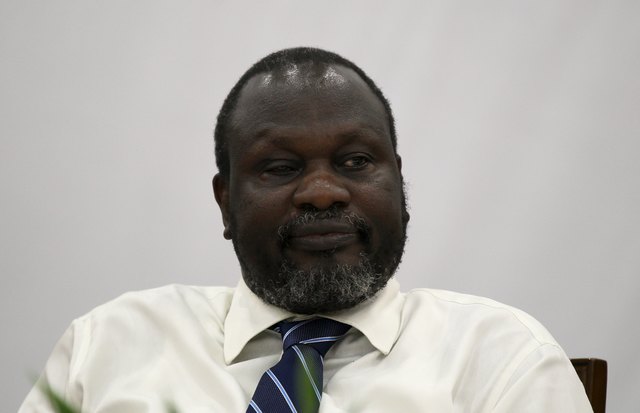South Sudan agrees deal on arms to let rebel Machar return: mediator

By Reuters
South Sudan’s government has agreed on weapons it will let rebel leader Riek Machar bring on his return to the capital as part of a peace deal, resolving a last-minute row that led to a delay this week, the government and the mediator said on Friday.
The announcement follows repeated delays to Machar’s return since a peace deal was signed in August and growing frustration in the international community with the warring sides after more than two years of conflict that has shattered the young nation.
Machar, who will take up the position of First Vice President to President Salva Kiir in a transitional government, had been due to return earlier this week but wrangling over what troops and weapons he could bring with him led to a fresh delay.
The Joint Monitoring and Evaluation Commission (JMEC), which includes Western powers, African representatives and others, proposed letting Machar bring 195 members of his forces, part of a quota agreed in a peace deal, and a limited amount of arms.
The rebels accepted the deal proposed on Thursday but the government balked at some listed weapons, including rocket propelled grenade launchers. It relented on Friday.
Government spokesman Michael Makuei said the government had accepted the terms “with immediate effect”.
“I welcome this concession by the government,” JMEC Chairman Festus Mogae said in a statement, after threatening a day before that he would seek an “appropriate response” from the U.N. Security Council and African Union if a deal was not reached.
“No further delay is tolerable,” said Mogae, a former president of Botswana, pushing for Machar’s return on Saturday.
Makuei said timing depended on verifying equipment and troop numbers, so Machar could return on Monday at the earliest.
Sponsors of the peace process fear the already fragile deal could unravel if it is not implemented more swiftly and differences are not patched up between Machar and Kiir.
Kiir’s sacking of Machar as his deputy in 2013 precipitated the crisis that led to a conflict in December 2013. Fighting has often run along ethnic lines, pitting Kiir’s dominant Dinka ethnic group against Machar’s Nuer.
Thousands of people have been killed and more than 2 million people forced to flee their homes during fighting in a nation that secured its independence in 2011.
Oil production, on which the government depends, has plummeted and many of the nation’s 11 million people have struggled to find enough food to eat.